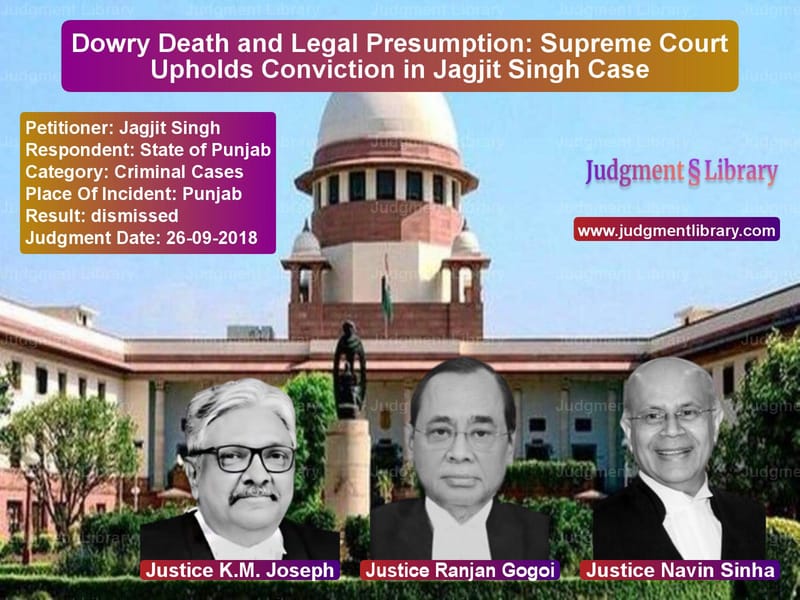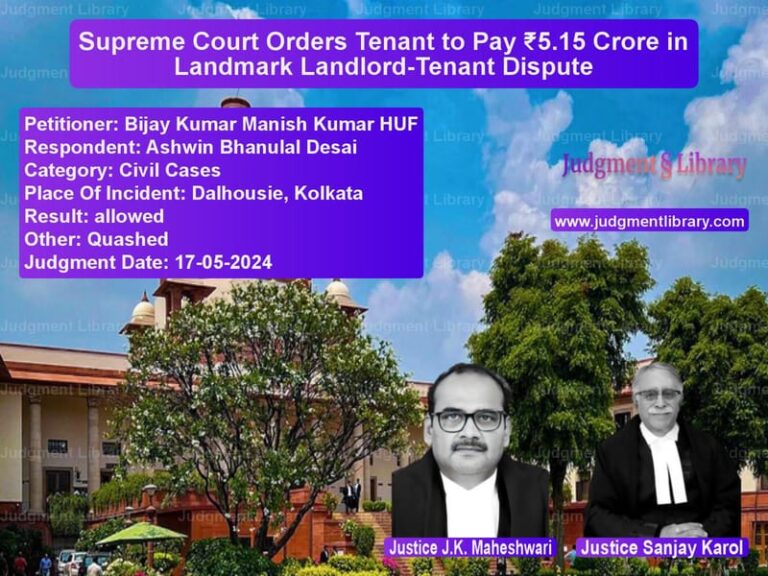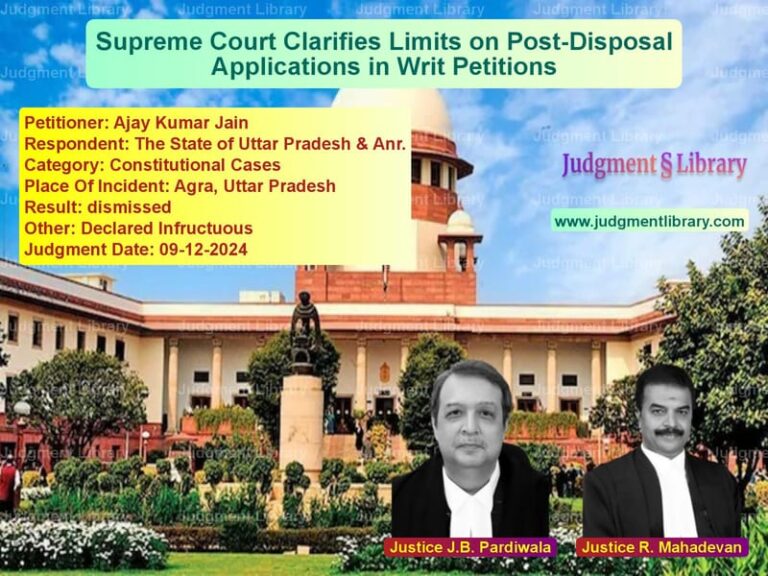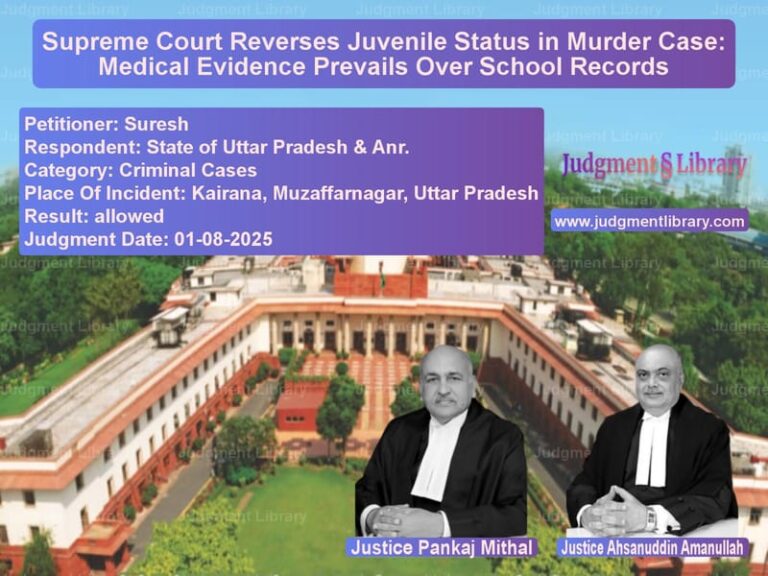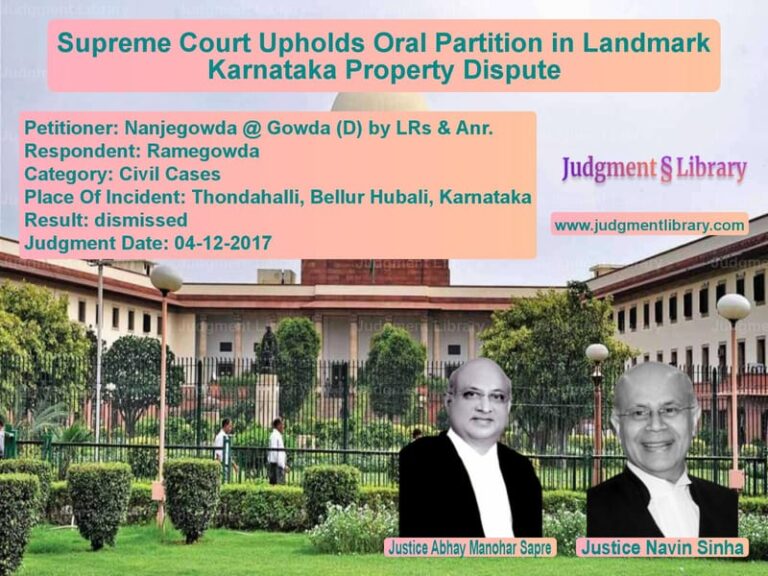Dowry Death and Legal Presumption: Supreme Court Upholds Conviction in Jagjit Singh Case
On 26th September 2018, the Supreme Court of India delivered a significant ruling in Jagjit Singh v. State of Punjab, reaffirming the legal principles surrounding dowry death under Section 304-B IPC. The judgment also emphasized the presumption under Section 113-B of the Evidence Act, which places the burden on the accused to disprove a dowry-related death if the victim has died under unnatural circumstances within seven years of marriage.
The case involved a tragic incident where the deceased, a young woman, died by drowning along with her child. The prosecution alleged that her death was a result of continuous harassment for dowry by her husband, Jagjit Singh, and his family. The Supreme Court upheld the conviction of the accused, rejecting arguments that sought to shift blame away from dowry harassment.
Background of the Case
The victim was married to Jagjit Singh on 24th January 1998. Unfortunately, her marriage ended in tragedy when she was found drowned in a river along with her child within seven years of marriage. The trial court convicted the appellant under Section 304-B IPC, sentencing him to eight years of rigorous imprisonment. However, the High Court of Punjab and Haryana reduced the sentence to seven years. The appellant then approached the Supreme Court, challenging the conviction.
Legal Issues and Key Questions
The case raised fundamental legal questions:
- Did the prosecution establish that the deceased was subjected to cruelty or harassment for dowry soon before her death?
- Did the presumption under Section 113-B of the Evidence Act apply in this case?
- Was there sufficient evidence to support the conviction under Section 304-B IPC?
Arguments by the Appellant (Jagjit Singh)
The appellant’s counsel, Dr. J.P. Dhanda, argued:
- The deceased took her own life due to personal reasons unrelated to dowry demands.
- The prosecution’s evidence was weak and relied on testimonies that lacked corroboration.
- The victim’s father (PW1) and sister (PW3) had exaggerated their statements regarding dowry harassment.
- The appellant had always supported his wife’s education, allowing her to pursue higher studies, which contradicted claims of cruelty.
- The deceased was allegedly influenced by her sister (PW3), who was married to an industrialist and used to taunt her about her lower financial status.
Arguments by the Respondent (State of Punjab)
The prosecution, represented by Ms. Jaspreet Gogia, countered:
- The victim was consistently harassed for dowry, including demands for a Maruti car or ₹2 lakhs.
- Her father (PW1) had even given an FDR of ₹30,000 to pacify the accused.
- Just before her death, she had called her father from a PCO, crying, and told him about her severe harassment.
- The presumption under Section 113-B of the Evidence Act must apply since the death occurred within seven years of marriage.
- The trial court and High Court had both evaluated the evidence and arrived at a consistent finding of guilt.
Supreme Court’s Observations
The Supreme Court, comprising Justice K.M. Joseph, Justice Ranjan Gogoi, and Justice Navin Sinha, carefully analyzed the legal framework of Section 304-B IPC and Section 113-B of the Evidence Act.
The Court emphasized:
“In order for the presumption under Section 113-B of the Evidence Act to apply, the prosecution must prove that the deceased was subjected to cruelty or harassment for, or in connection with, any demand for dowry soon before her death.”
The Court further stated:
“The words ‘soon before’ do not mean ‘immediately before’ but indicate proximity between the demand for dowry and the unnatural death of the woman.”
Final Judgment
The Supreme Court upheld the appellant’s conviction, stating:
“There is sufficient evidence to prove that the deceased was subjected to cruelty in connection with dowry demands. The conviction under Section 304-B IPC is justified.”
The Court, however, maintained the reduced sentence of seven years as decided by the High Court.
Impact of the Judgment
This ruling reinforces the legal framework surrounding dowry deaths in India and highlights the importance of the presumption under Section 113-B of the Evidence Act. Key takeaways from this judgment include:
- Legal presumption in dowry deaths: If a woman dies under unnatural circumstances within seven years of marriage, and there is evidence of dowry-related harassment, the court presumes the husband’s involvement.
- Defendant’s burden to disprove: The accused must produce strong evidence to rebut this presumption.
- Strict enforcement of Section 304-B IPC: The ruling strengthens the legal framework protecting married women from dowry harassment.
- Judicial consistency: The Supreme Court’s decision affirms the findings of both the trial court and the High Court.
This judgment serves as an important precedent in cases involving unnatural deaths of married women, reinforcing the principle that demand for dowry and subsequent harassment will not go unpunished.
Petitioner Name: Jagjit Singh.Respondent Name: State of Punjab.Judgment By: Justice K.M. Joseph, Justice Ranjan Gogoi, Justice Navin Sinha.Place Of Incident: Punjab.Judgment Date: 26-09-2018.
Don’t miss out on the full details! Download the complete judgment in PDF format below and gain valuable insights instantly!
Download Judgment: Jagjit Singh vs State of Punjab Supreme Court of India Judgment Dated 26-09-2018.pdf
Direct Downlaod Judgment: Direct downlaod this Judgment
See all petitions in Dowry Cases
See all petitions in Suicide Cases
See all petitions in SC/ST Act Case
See all petitions in Judgment by K.M. Joseph
See all petitions in Judgment by Ranjan Gogoi
See all petitions in Judgment by Navin Sinha
See all petitions in dismissed
See all petitions in supreme court of India judgments September 2018
See all petitions in 2018 judgments
See all posts in Criminal Cases Category
See all allowed petitions in Criminal Cases Category
See all Dismissed petitions in Criminal Cases Category
See all partially allowed petitions in Criminal Cases Category

